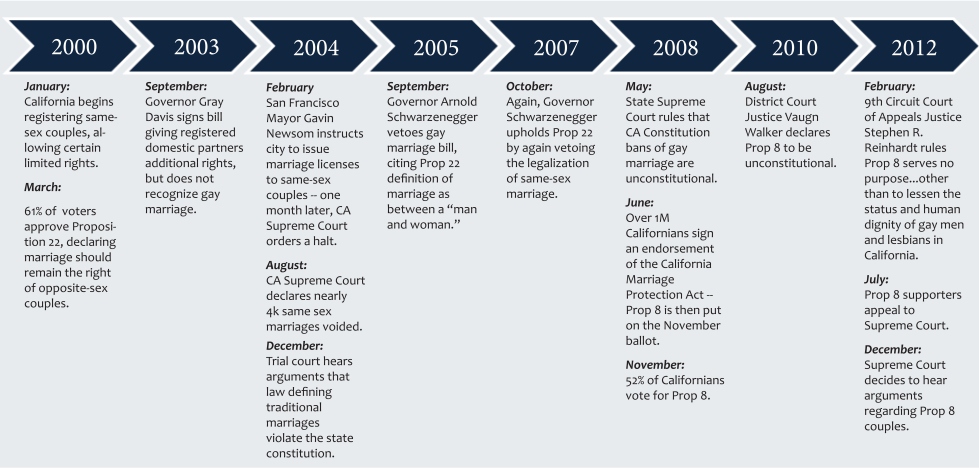Prop 8 and DOMA: Where Do We Stand Now?
Divorce Attorney
by Vanessa Soto Nellis
818.907.3274
In two 5-4 decisions this morning, the U.S. Supreme Court dismissed a Proposition 8 appeal that denied same-sex couples the right to marry in California, as well as an important part of the federal Defense of Marriage Act, or DOMA.
The judicial majority in Hollingsworth et al. v. Perry et al., headed by Chief Justice John Roberts – and joined by Justices Antonin Scalia, Ruth Bader Ginsburg, Stephen Breyer and Elena Kagan – did not hand down an opinion on a broader and more key question: Is same-sex marriage an equal protection right that should apply to all states?

Justice Roberts explains the majority decision to deny the California Prop 8 appeal, which denial in effect, reinstates legal marriages for same-sex couples:
Once Proposition 8 was approved, it became a duly enacted constitutional amendment. Petitioners have no role—special or otherwise—in its enforcement. They therefore have no “personal stake” in defending its enforcement that is distinguishable from the general interest of every California citizen. No matter how deeply committed petitioners may be to upholding Proposition 8, that is not a particularized interest sufficient to create a case or controversy under Article III.
The four dissenters (Justices Anthony Kennedy, Clarence Thomas, Samuel Alito and Sonia Sotomayor) however, say there was a missing element in the decision-making. Justice Kennedy elaborates:
The essence of democracy is that the right to make law rests in the people and flows to the government, not the other way around. Freedom resides first in the people without need of a grant from government. The California initiative process embodies these principles and has done so for over a century…. In California and the 26 other states that permit initiatives and popular referendums, the people have exercised their own inherent sovereign right to govern themselves. The court today frustrates that choice.
As for DOMA, Justice Kennedy wrote the opinion (and Justices Ginsburg, Breyer, Sotomayor and Kagan joined) regarding United States v. Windsor:
DOMA’s principal effect is to identify and make unequal a subset of state-sanctioned marriages. It contrives to deprive some couples married under the laws of their State, but not others, of both rights and responsibilities, creating two contradictory marriage regimes within the same State.
Same-Sex Couples – Legal Timeline
In 1996, Congress adopted DOMA, which denied all benefits or legal standing to same-sex couples. But in 2000, California began registering same-sex couples as domestic partners, and allowing them certain government and insurance benefits, child custody, and hospital visitation rights.

CALIFORNIA’S PROP 8 TIMELINE – Source: huffingtonpost.comA lot of back-and-forth among politicians, political groups, and religious authorities resulted in state and federal court battles, but currently Washington D.C. and 12 states authorize gay marriages.
Though the Court’s decisions regarding DOMA and California’s Prop 8 are significant wins for same-sex marriage proponents, the arguments are not over.
Vanessa Soto Nellis is a Family Law Attorney and Shareholder at our Firm. Contact her via email: vnellis@lewitthackman.com.
